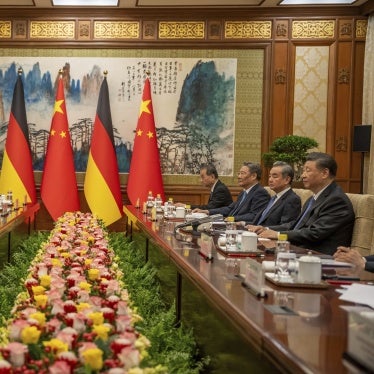Justice and Accountability for the June 2010 Ethnic Violence
- Authorities have failed to provide justice for victims and hold perpetrators to account following the June 2010 inter-ethnic violence in the south that left hundreds dead and thousands injured, undermining long-term efforts to promote stability.
- Investigations and trials into the violence that continue to date have been profoundly flawed, marred by violations of the defendants’ rights from the time of detention through to conviction.
- Defendants’ fair trial rights have also been undermined by hostility and violence in the courtrooms, including, for example, attacks on ethnic Uzbek defendants and their lawyers by audience members. Attacks of this nature have taken place as recently as early June 2013, with authorities taking little or no action to stop the violence.
- These violations continue to undermine efforts to promote reconciliation and fuel tensions that might one day lead to renewed violence.
President Atambaev should be urged to call for an independent review of all proceedings related to the June 2010 violence and for proceedings to be reopened in cases in which the authorities have not properly investigated allegations of torture, or in which there have been serious violations of defendants’ fair trial rights.
For more details about the types of violations that have occurred in the context of the authorities’ flawed investigation into the violence, please see HRW’s June 2011 report entitled Distorted Justice: https://www.hrw.org/reports/2011/06/08/distorted-justice-0; for a more recent account, please see HRW’s June 2010 3rd anniversary statement: https://www.hrw.org/news/2013/06/07/kyrgyzstan-3-years-after-violence-mockery-justice; for a description of recent examples of courtroom hostility and attacks, please see: https://www.hrw.org/news/2013/04/04/kyrgyzstan-violence-mars-supreme-court-hearing and https://www.hrw.org/news/2013/05/16/kyrgyzstan-protect-uzbek-defendant.
Wrongful Imprisonment of Azimjon Askarov
- Azimjon Askarov, an ethnic Uzbek human rights defender from southern Kyrgyzstan, was sentenced to life in prison in September 2010 for his alleged role in the June violence—an incident in which a Kyrgyz policeman was killed. Askarov remains wrongfully imprisoned, following a trial marred by serious violations of fair trial standards, including credible allegations by Askarov that he was tortured in custody. His case is illustrative as an example of the broader pattern of flawed justice for the June 2010 events.
- Prosecutorial authorities have repeatedly refused to open a criminal investigation into Askarov’s allegations of torture. In December 2011, the Supreme Court upheld Askarov’s life sentence, despite the unfair trial that led to his conviction.
- In November 2012, Askarov and his lawyers filed an individual complaint to the UN Human Rights Committee, where it is currently pending.
President Atambaev’s Brussels visit should be seized upon as an important opportunity to call for Azimjon Askarov’s immediate release pending a full and impartial review of his case and allegations of torture.
For more information on Askarov’s case, please see the following HRW statements and letter:
https://www.hrw.org/news/2010/09/15/kyrgyzstan-free-human-rights-defender-ensure-fair-retrial
https://www.hrw.org/news/2010/06/23/kyrgyzstan-ensure-safety-due-process-detained-activist
https://www.hrw.org/news/2011/12/20/kyrgyzstan-verdict-fails-justice
https://www.hrw.org/news/2010/06/17/letter-prosecutor-general-ibraev-urging-release-azimjon-askarov
Torture and Torture Reform
- Torture and ill-treatmentpersist as a widespread problems and impunity for torture and ill-treatment is pervasive, despite a number of positive steps authorities have taken to tackle torture following the June 2013 violence (such examples include a visit by the Special Rapporteur on torture in December 2011, the adoption of a national torture prevention mechanism, and amendments to the criminal code to bring the definition of torture in line with international standards).
- HRW’s research and that of many others in southern Kyrgyzstan has found that the use of torture by law-enforcement officials in their investigations into the June 2010 violence was widespread and that prosecutorial authorities have repeatedly refused to investigate serious and credible allegations of torture.
- Ethnic Uzbeks have been at a heightened risk of torture in custody in the context of the investigations into the June 2010 violence. Even in the most egregious cases, such as that of Usmonzhon Kholmirzaev, an ethnic Uzbek who died of internal injuries in August 2011 after he was beaten by police in custody, authorities have as yet failed to bring the perpetrators to justice.
President Atambaev should be urged to immediately raise the problem of impunity for torture with the Prosecutor General of Kyrgyzstan, and call on the Prosecutor General’s office to promptly and impartially investigate all allegations of torture and prosecute to the fullest extent of the law.
For more information about torture in the context of the investigation into the June 2010 violence, please see our June 2011 report Distorted Justice: https://www.hrw.org/reports/2011/06/08/distorted-justice-0
For more information about Usmonjon Kholmirzaev’s case, please see: https://www.hrw.org/news/2011/08/11/kyrgyzstan-death-follows-police-torture and https://www.hrw.org/news/2013/06/07/kyrgyzstan-3-years-after-violence-mockery-justice.
Gender-based Violence and Discrimination and Violence on the Basis of Sexual Orientation and Gender Identity
- The Kyrgyz government has not effectively addressed long-standing problems of gender-based violence. Domestic violence in Kyrgyzstan is widespread, as is bride abduction, despite the adoption, in February 2013, of a legislative amendment to increase the maximum jail sentence for bride-kidnapping from three to seven years (ten years if the girl is under seventeen years of age).
- Violence and discrimination against lesbian, gay, bisexual, and transgender personsare serious concerns. Gay and bisexual men are at serious risk of extortion schemes and physical and sexual violence at the hands of the police. These abuses largely go unpunished due to fear of repercussions and vulnerable groups’ general lack of trust in existing legal and police measures to address police abuse. Government bodies rarely engage with LGBT groups to address these concerns.
President Atambaev should be urged to call on the Prosecutor General’s office to enforce existing criminal laws against assault and abduction, and prosecute perpetrators of gender-based violence and bride-kidnapping to the fullest extent of the law. He should also be urged to support and initiate concrete measures to address discrimination on the basis of sexual orientation and gender identity, including ensuring that effective remedies are available to lesbian, gay, bisexual, and transgender people who face violence and discrimination by their families, police officers, and/or street gangs.
For more background information about domestic violence and bride-kidnapping, please see: https://www.hrw.org/reports/2006/09/26/reconciled-violence.
For more background information on violence and discrimination against members of the LGBT community, please see: https://www.hrw.org/reports/2008/10/06/these-everyday-humiliations-0 and https://www.hrw.org/news/2012/10/04/kyrgyzstan-film-ban-violates-free-speech.








